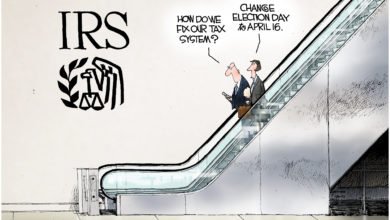17 Sharp Quotes from Mises’ Famous Essay ‘Profit and Loss’
The pundits on the political left seem to have a roster of anti-capitalist catchphrases they like to draw from in their rhetoric. “Trickle down economics doesn’t work,” “Tax the rich,” and “Workers deserve a living wage” are among their favorites.
Another favorite is “People over profit.” The idea seems to be that capitalists, when left to their own devices, will increase prices for consumers and lower wages for workers in order to maximize their profit margins. They will also take safety shortcuts and commit fraud—anything to make a buck. This is bad, the reasoning goes, because it exploits the “people” in this process—namely, the workers and consumers—and makes profit more important than their well being.
This view of capitalism and profit is superficially plausible, but it contains some considerable holes upon closer inspection. For one, competition sets rigid limits on the prices a capitalist can charge and the wages they must pay. If a capitalist pays too little or charges too much, their workers and customers will simply go elsewhere.
Major safety shortcuts and fraud are clearly problematic, but again, what capitalist can get away with these in perpetuity? This view makes workers and consumers out to be helpless victims of capitalist oppressors, when in reality they have many options available to them. A capitalist only succeeds if they offer a better job package and sell a better product than any other business on the market. By choosing to do business with a given entrepreneur, the workers and consumers are tacitly admitting that, far from harming them, this entrepreneur is providing the best option they have.
The other problem with the anti-profit crowd is that they completely overlook the role profit plays in the economy, perhaps because they are unaware that it even serves an economic purpose. But it does. Profit—or, more accurately, profit and loss—provides a vital signal that helps us coordinate our resource use and thereby become more prosperous.
In an effort to defend this signal from its assailants, the 20th century economist Ludwig von Mises penned a 56-page paper in 1951 titled Profit and Loss. The essay draws on his decades of experience as a leading economist to make the case for free-market capitalism, and in particular for a hands-off approach to entrepreneurship. Combining theoretical rigor with clear and candid prose, Mises explains the economic function of profit and loss and pushes back on those who bemoan the “greed” and “profiteering” of capitalists. High profits are actually good, he explains, because they indicate that the entrepreneur who earns them has removed misallocations of resources in the market. The higher the profits, the more the entrepreneur has helped consumers.
The excerpts below provide a glimpse at some of the trenchant points Mises makes in this forceful paper.
“The consumers by their buying and abstention from buying elect the entrepreneurs in a daily repeated plebiscite as it were. They determine who should own and who not, and how much each owner should own.”
“Those who know how to take advantage of any business opportunity cropping up will always find the capital required. For the market is always full of capitalists anxious to find the most promising employment for their funds and in search of the ingenious newcomers, in partnership with whom they could execute the most remunerative projects.”
“Capital does not ‘beget profit’ as Marx thought. The capital goods as such are dead things that in themselves do not accomplish anything. If they are utilized according to a good idea, profit results. If they are utilized according to a mistaken idea, no profit or losses result. It is the entrepreneurial decision that creates either profit or loss. It is mental acts, the mind of the entrepreneur, from which profits ultimately originate. Profit is a product of the mind, of success in anticipating the future state of the market. It is a spiritual and intellectual phenomenon.”
“Taxing profits is tantamount to taxing success in best serving the public. The only goal of all production activities is to employ the factors of production in such a way that they render the highest possible output. The smaller the input required for the production of an article becomes, the more of the scarce factors of production are left for the production of other articles. But the better an entrepreneur succeeds in this regard, the more is he vilified and the more is he soaked by taxation. Increasing costs per unit of output, that is, waste, is praised as a virtue.”
“All people, entrepreneurs as well as non-entrepreneurs, look askance upon any profits earned by other people. Envy is a common weakness of men. People are loath to acknowledge the fact that they themselves could have earned profits if they had displayed the same foresight and judgment the successful businessman did. Their resentment is the more violent, the more they are subconsciously aware of this fact.”
“There is no other standard available for the distinction between profiteering and earning fair profits than that provided by the censor’s personal envy and resentment.”
“The suggestion to abolish the entrepreneur’s profit for the benefit of the employees aims not at the abolition of profit. It aims at wresting it from the hands of the entrepreneur and handing it over to his employees.”
“Capitalism cannot survive the abolition of profit. It is profit and loss that force the capitalists to employ their capital for the best possible service to the consumers. It is profit and loss that make those people supreme in the conduct of business who are best fit to satisfy the public. If profit is abolished, chaos results.”
“It is precisely the necessity of making profits and avoiding losses that gives to the consumers a firm hold over the entrepreneurs and forces them to comply with the wishes of the people.”
“Huge profits are the proof of good service rendered in supplying the consumers. Losses are the proof of blunders committed, of failure to perform satisfactorily the tasks incumbent upon an entrepreneur. The riches of successful entrepreneurs are not the cause of anybody’s poverty; it is the consequence of the fact that the consumers are better supplied than they would have been in the absence of the entrepreneur’s effort. The penury of millions in the backward countries is not caused by anybody’s opulence; it is the correlative of the fact that their country lacks entrepreneurs who have acquired riches. The standard of living of the common man is highest in those countries which have the greatest number of wealthy entrepreneurs. It is to the foremost material interest of everybody that control of the factors of production should be concentrated in the hands of those who know how to utilize them in the most efficient way.”
“Historians are mistaken in explaining the rise of Nazism by referring to real or imaginary adversities and hardships of the German people. What made the Germans support almost unanimously the twenty-five points of the ‘unalterable’ Hitler program was not some conditions which they deemed unsatisfactory, but their expectation that the execution of this program would remove their complaints and render them happier. They turned to Nazism because they lacked common sense and intelligence. They were not judicious enough to recognize in time the disasters that Nazism was bound to bring upon them. The immense majority of the world’s population is extremely poor when compared with the average standard of living of the capitalist nations. But this poverty does not explain their propensity to adopt the communist program. They are anti-capitalistic because they are blinded by envy, ignorance, and too dull to appreciate correctly the causes of their distress. There is but one means to improve their material conditions, namely, to convince them that only capitalism can render them more prosperous.”
“As soon as the problem of profits is raised, people shift it from the praxeological sphere into the sphere of ethical judgments of value. Then everybody glories in the aureole of a saint and an ascetic. He himself does not care for money and material well-being. He serves his fellow men to the best of his abilities unselfishly. He strives after higher and nobler things than wealth. Thank God, he is not one of those egoistic profiteers…Practically everybody aims at improving the material conditions of his existence. Public opinion takes no offense at the endeavors of farmers, workers, clerks, teachers, doctors, ministers, and people from many other callings to earn as much as they can. But it censures the capitalists and entrepreneurs for their greed.”
“Everybody is eager to charge for his services and accomplishments as much as the traffic can bear. In this regard there is no difference between the workers, whether unionized or not, the ministers, and teachers on the one hand and the entrepreneurs on the other hand. None of them has the right to talk as if he were Francis d’Assisi.”
Likewise, everyone is eager to pay as little as possible for the products they buy. The entrepreneur who pays as little as possible for the services of a worker is no different than a customer who pays as little as possible for his haircut. If the “People Over Profit” advocates are serious, perhaps they should voluntarily take a pay cut at their job and voluntarily pay more for their haircuts than their hairdresser charges.
“There is no reason why capitalists and entrepreneurs should be ashamed of earning profits. It is silly that some people try to defend American capitalism by declaring: ‘The record of American business is good; profits are not too high.’ The function of entrepreneurs is to make profits; high profits are the proof that they have well performed their task of removing maladjustments of production.”
I would add that the whole notion of “giving back” erroneously implies that rich entrepreneurs took something in the first place. But an entrepreneur who makes profits is hardly a plunderer. On the contrary, they are providing goods and services that are extremely valuable to consumers. That’s why people are willing to pay so much in the first place. True, they accept people’s money, but the fact that they have a surplus of money left over after their transactions (and after accounting for interest and the value of their own labor) is evidence that they have provided more for society than they have used up. “Profit is not a sign that people need to give back to society,” Prof. Antony Davies notes. “In fact it’s the reverse. Profit, when attained in a free market environment, is a sign that society actually owes the person more goods and services than he has already consumed.”
“Of course, as a rule capitalists and entrepreneurs are not saints excelling in the virtue of self-denial. But neither are their critics saintly. And with all the regard due to the sublime self-effacement of saints, we cannot help stating the fact that the world would be in a rather desolate condition if it were peopled exclusively by men not interested in the pursuit of material well-being.”
People love to disparage “materialism” and esteem “higher values” instead. But as Mises points out, the result of such an attitude is crushing poverty. Keep in mind, material prosperity isn’t usually about accumulating lots of stuff. Much more often it takes the form of medicine that can keep our loved ones alive, or greater access to mental health services. It looks like access to more nutritious and abundant food, more time off work, and more resources that can be put toward cleaning up the environment. Sure, material prosperity isn’t everything, but we’re kidding ourselves to say it isn’t important.
To finish off, here are some warnings from Mises on the consequences of turning our backs on profit.
“The elimination of profit, whatever methods may be resorted to for its execution, must transform society into a senseless jumble. It would create poverty for all.”
“Every step toward the elimination of profit is progress on the way toward social disintegration.”
A free, online version of Profit and Loss is available from the Mises Institute here.
Content syndicated from Fee.org (FEE) under Creative Commons license.




